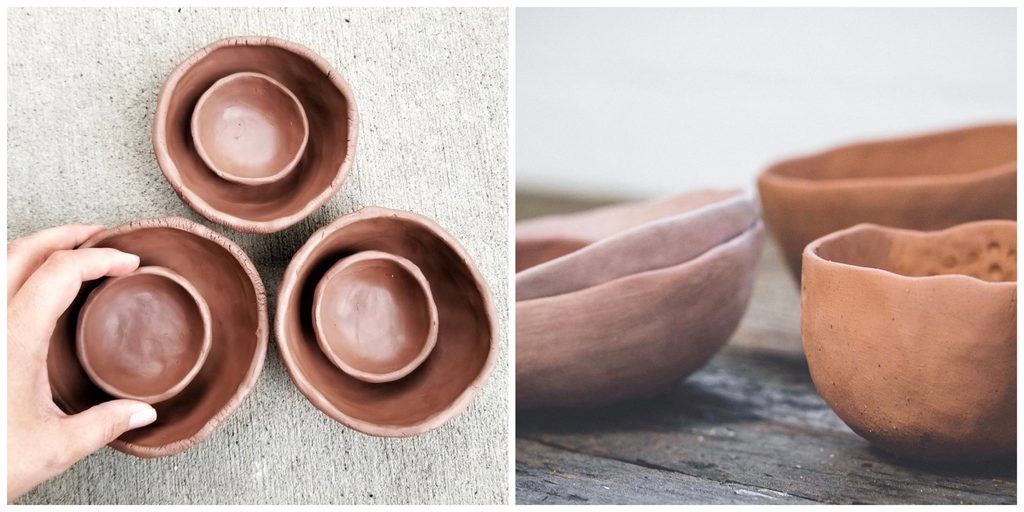
When we first started on this little journey of ours, we've always wondered why ceramic pieces can have such different forms from each other even though they were all handmade. Some pieces were so flawlessly symmetrical while some had the 'purposely-left-uneven look'. We even thought that it was because of the skill level of the artisan (how foolish were we back then?)
After numerous conversations and an attempted wheel-throwing course, we've been enlightened slightly and since we've had plenty of similar ceramic-technique questions from you guys, we shall attempt to lay it out here!
 Jono Smart's wheel-thrown cups looking extremely uniformly shaped
Jono Smart's wheel-thrown cups looking extremely uniformly shapedWhile certain vessels would be easier to achieve using one of these processes over another, it all depends on the style, taste, and one’s tolerance.
- Adam Welch, director of Greenwich House Pottery
There are three main methods of pottery making - hand building, wheel throwing and slipcasting. In this post, we will be covering the method that has been around the longest - hand building.
Hand Building
Hand building is the simple technique of using your hands and simple tools to create the ceramic pieces. It came about way before the wheel was invented and remains to be the easiest method to pick up. The three hand builiding methods are slab construction, coiling and pinching.
1. Slab construction
Clay is first rolled out using either a slab roller or a normal baking rolling pin. After which, the slabs will be cut into your desired layout and then shaped into your final product.
 Hard to tell that all of these came from slabs right?
Hard to tell that all of these came from slabs right?
This method allows the maker to imprint or stamp any design they want on the flattened clay. Some of the common ceramic tableware that were made using slabs are those with the laces and plant imprint (see below).
 WIPs of Kanimbla Clay's plant series & lace plates from Ignata Ceramics
WIPs of Kanimbla Clay's plant series & lace plates from Ignata Ceramics

Some of Knotwork LA's beautiful plates made from slabs
Here's something even more unique - Linda Hsiao's (Knotwork LA) porcelain and stoneware inlaid slabs. Each piece is rolled with a variety of colours layered over each other.
 Rossella's slabs are joined up at the edges to form the cube planters
Rossella's slabs are joined up at the edges to form the cube planters
2. Coiling
For bigger ceramic pieces, most makers would consider using the second type of hand building method, coiling. Rolls of clay are placed on top of one another and is smoothened out as it goes along. This would gradually form the walls of a vessel.
 Check out Pinar Baklan's huge vessel
Check out Pinar Baklan's huge vessel
 Sometimes, the coils are intentionally not smoothened out to give a slightly different texture to the walls of the vessel.
Sometimes, the coils are intentionally not smoothened out to give a slightly different texture to the walls of the vessel.
 Aron Fischer's coils give these vessels a different texture
Aron Fischer's coils give these vessels a different texture
Some makers, such as Aron Fischer (Facture Goods), use the coiling method combined with a base to make bigger pots.
3. Pinching
The last type of hand building method is 'pinching'. Starting off with a ball of clay, you push your thumb into it and gradually pinch the wall higher.
 Here's Rani Aryani handbuilding her pinch pots
Here's Rani Aryani handbuilding her pinch pots
 Completed pinch pots waiting to be dried and fired (by Gabrielle Schaffner)
Completed pinch pots waiting to be dried and fired (by Gabrielle Schaffner)
 Both slab construction and pinching methods are used in Atelier Stella Ceramics' pots.
Both slab construction and pinching methods are used in Atelier Stella Ceramics' pots. ---
Hope we've done a good enough job in explaining the different types of hand building methods! Now, it's time for you to try your hand at pottery making and feel free to let us know if we made any mistakes in the post (we're trying our best!).


Comments
Somayeh:
Hey honey. I really enjoyed reading your explanations about diffrent kinds of pottery methods. I’m an Iranian studio potter. I’ve used slab and pinch methods for meny years and I find them so uniqe and beautiful. Be happy all the time🎄😊
Dec 21, 2022
Leave a comment